#Aya Africa
Text
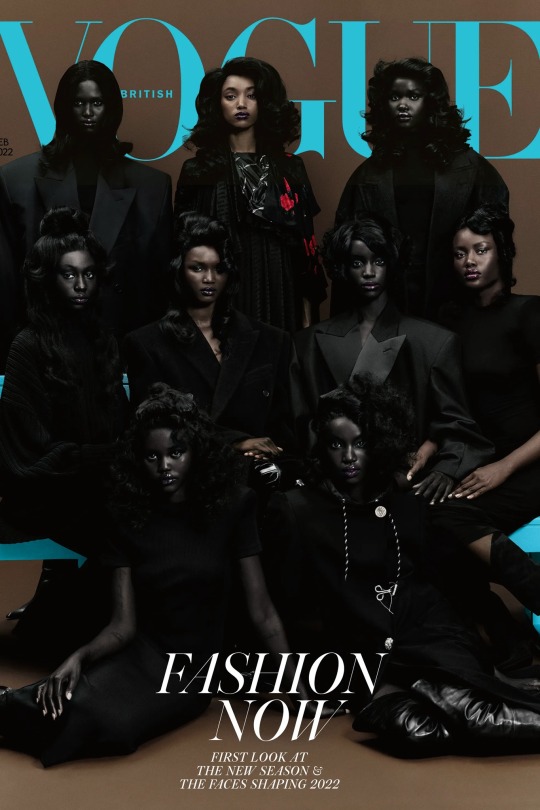

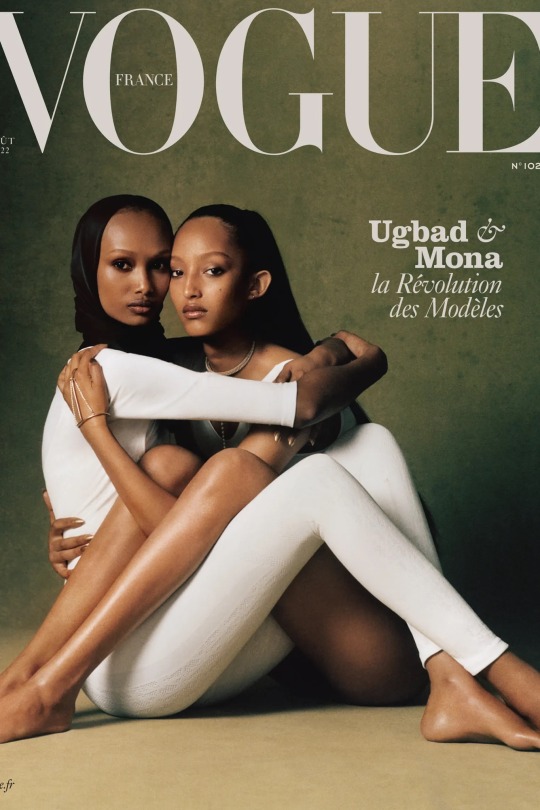

Don’t tell me that you model if you ain’t been in Vogue because the African girlies are killing it
#aya nakamura#anok yai#adut akech#amar akway#majesty amare#akon changkou#maty fall#janet jumbo#abeny nhial#nyagua ruea#ugbad abdi#mona tougaard#iman#imaan hammam#vogue france#vogue arabia#british vogue#africa#african beauty#black women#black beauty#hijab
19 notes
·
View notes
Text

Aya Bauer (@ aya_bauer)
4 notes
·
View notes
Text
🇨🇮 Côte d'Ivoire (Ivory Coast)
Region: West Africa
Aya: Life in Yop City
Author: Marguerite Abouet, Clément Oubrerie
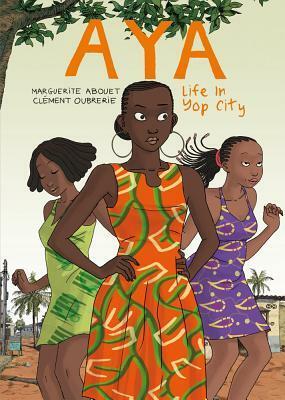
376 pages, published 2012
Original language: French
Native author? Yes
Age: Teen
Blurb:
Ivory Coast, 1978. It's a golden time, and the nation, too-an oasis of affluence and stability in West Africa-seems fueled by something wondrous. Aya is loosely based upon Marguerite Abouet's youth in Yop City. It is the story of the studious and clear-sighted nineteen-year-old Aya, her easygoing friends Adjoua and Bintou, and their meddling relatives and neighbors. It's a wryly funny, breezy account of the simple pleasures and private troubles of everyday life in Yop City.
Clément Oubrerie's warm colors and energetic, playful line connect expressively with Marguerite Abouet's vibrant writing.
Other reps:
Genres: #historical 20th century #slice of life #romance #graphic novel
My thoughts:
So far the only graphic novel on my world list. This book looks like a lot of fun and I can’t wait to see it.
Review to come.
Link to buy
#cote d'ivoire#ivory coast#ya world challenge#diverse books#graphic novel#historical 20th century#slice of life#romance#africa#west africa#aya life in yop city#Marguerite Abouet#Clément Oubrerie#yop city
6 notes
·
View notes
Video
youtube
Ayra Starr - Sability (Akay & co)
0 notes
Text
So the most listened to (internationally) French artist happens to be a Black woman, her artist name is Aya Nakamura. She is the only woman in France in the top 20 of the most listened to artists. She was born in Mali (Bamako) came in France as a young child with her family and she now has the French citizenship.
She might be the one singing (a song from Edith Piaf) during the Olympics opening ceremony in France.
Again she is the most famous French artists right now internationally.
White people are putting signs saying “No way for Aya, this is Paris not the market of Bamako”. That’s how racist France is.
But wanna know the icing on the cake? The reaction of some politicians on the left. Sandrine Rousseau defending Aya by saying that it would give the image of a “tolerant and open” France. This is all about “image” they don’t want to stop being racists pieces of shit they want to be able to do it while still looking good and anti racists.
You say “this is Paris not Bamako” meanwhile when Black and Arabs undocumented workers went on strike the construction site of the Olympics had to fucking slow down and stop in some sites because there was enough undocumented workers on those construction sites that their absence meant not being able to continue.
You say “this is Paris not Bamako” meanwhile the only reason your health system hasn’t completely collapsed is because 1 doctor out of 4 is born abroad. Some of your hospitals would close without foreign doctors (Algerians represent almost 25% of the foreign doctors in France.
So you know what? This is Bamako. This is Algiers. This is Dakar. Without us you wouldn’t be a rich country. If you didn’t want us here you shouldn’t have colonized our people and shouldn’t keep looting our countries while financing corrupted governments, organizing assassinations of rulers who want to decolonize Africa and organizing uprising against them.
(P.S: Le premier qui vient défendre Sandrine Rousseau je le bloque ici on soutient la gauche révolutionnaire et porteuse de valises pas la gauche avec des relents de paternalisme colonial qui bégaie dès qu’il faut prendre position correctement contre le racisme)
353 notes
·
View notes
Text
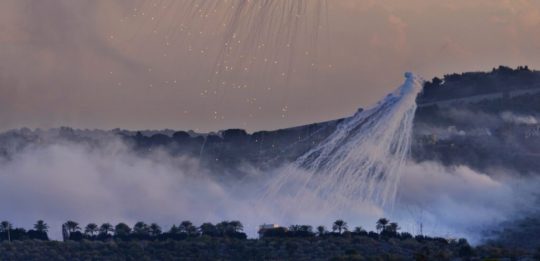
The Israeli army fired artillery shells containing white phosphorus, an incendiary weapon, in military operations along Lebanon’s southern border between 10 and 16 October 2023, Amnesty International said today. One attack on the town of Dhayra on 16 October must be investigated as a war crime because it was an indiscriminate attack that injured at least nine civilians and damaged civilian objects, and was therefore unlawful, said the organization.
Cross-border hostilities in southern Lebanon have escalated significantly since 7 October. Israeli shelling in Lebanon has killedopens in a new tab at least fouropens in a new tab civilians and 48 Hezbollah members so far. Hezbollah and other armed groups have also fired rockets at northern Israel, killing six Israeli soldiers and one Israeli civilianopens in a new tab, according to the Israeli army. Amnesty International is investigating attacks by Hezbollah and other armed groups on northern Israel to determine whether they violated international humanitarian law.
“It is beyond horrific that the Israeli army has indiscriminately used white phosphorous in violation of international humanitarian law. The unlawful use of white phosphorus in Lebanon in the town of Dhayra on 16 October has seriously endangered the lives of civilians, many of whom were hospitalized and displaced, and whose homes and cars caught fire,” said Aya Majzoub, Deputy Regional Director for the Middle East and North Africa at Amnesty International.
“With concern growing about an intensification of the hostilities in southern Lebanon, the Israeli army must immediately halt the use of white phosphorus, especially in populated areas, in line with its forgotten 2013 pledge to stop using these weapons. It must abide by its commitment and stop further endangering the lives of civilians in Lebanon.” (Amnesty International)
7 notes
·
View notes
Text
“Oh boy! Like Lion King!” - Africa, Pop Culture, and The Book of Mormon
I think we can all agree that The Book of Mormon hasn’t aged well.
It’s been twelve years since The Book of Mormon opened on Broadway, which is crazy to think about. Twelve years ago we all thought Mitt Romney was the worst thing that could happen to the US.
Two years ago the US took another look at racism. The Black production members spearheaded an effort to review the show. The goals of this review were to address the way the African characters are portrayed and to center them more in the work.
I’m not familiar with the outcome of this effort. It’s hard to find details on the show’s new look, apart from some little tidbits regarding the main female lead and her actions in the show.
But I think there is one element of The Book of Mormon that critics have been failing to address for a long time - an element that is built into the bones of the show, yet goes unnoticed.
When Elders Price and Cunningham are told where they’re going to go on their mission, we get our first glimpse:
VOICE: And your mission location is...UGANDA!
[Music stops.]
ELDER PRICE: ...Uganda?
ELDER CUNNINGHAM: UGANDA? Cool! Where is that?!
VOICE: Africa!
[Price looks visibly upset, but then bucks up and tries to rally himself.]
ELDER CUNNINGHAM: Oh BOY - like Lion King!
and few pages in the script later:
PRICE’S DAD: ...You’re heading...TO AFRICA!!!!!
[The families make it offstage. The lights go dark and a spot comes up on a Lion King-like character who enters stage.]
LION KING CHARACTER: Hey na da hey na! Aya bubbu taya tayaaaaaa! Haiyaaaa tayaaaa mala ennyaaaaaa! Hey naaa naaa naaa da hayaaa!
[Finally the lights come up, the families are back, and we are STILL at the airport.]
PRICE’S DAD: How did you like THAT, boys?! A real LION KING SEND-OFF! We got Mrs Brown to sing like an African for you.
ELDER PRICE: That’s great dad, thanks.
LION KING CHARACTER: [Waving] Good luck, boys! I’ve never been to Africa, but I’m sure it’s a hoot!
The only thing Americans know about Africa is Lion King. The show is hammering this point home to us.
We’re immediately set up to think of Africa through a pop cultural lens. And as soon as the Elders get to Uganda, we’re immediately shown a different image of Africa: poverty, militia violence, and AIDS.
This is another idea of Africa rooted in American pop culture. Yes, these things exist in Africa, but Africa is a much more diverse and dynamic place that American pop culture gives it credit for.
And yet, we’re presented with two takes on Africa heavily rooted in American pop culture. The Africa we’re shown in The Book of Mormon is not authentic. I don’t believe this is an accident! I don’t believe this is a lazy American team failing to understand what really makes Africa.
Pop culture is a theme woven throughout the show, besides the constant Lion King jokes. When Elder Cunningham forgets his Mormon theology, he falls back on pop culture, like Star Wars and Lord of the Rings. By weaving pop culture into his missionary work, he finds himself successfully getting through to the Ugandan villagers where the other Mormon missionaries have failed.
And in the end, the converted villagers present a new story of Joseph Smith, one built with the pop culture they’ve been introduced to.
After all, the show asks, are religious stories not just another form of pop culture? Our myths, our legends, the stories that inform our lives - whether they be out of a religious document or owned by Disney, it’s the stories we tell that make life meaningful. And when we no longer find meaning in these stories, we can adapt and change them to make new meaning.
It’s the stories we tell that are powerful - powerful enough to inform Americans’ view of a whole continent.
In The Book of Mormon, we’re presented with a pop cultural version of Africa. But unlike most American media that depicts Africa in this way, we’re asked to examine our conceptions and where they come from, and how they do not reflect reality.
Unfortunately, I don’t think the show is successful in asking this question.
The Book of Mormon is frequently called out for its depictions and treatment of Africa and the African characters. And rightfully so. The African characters come off as primitive, disease-ridden, and sexually violent. In many ways, I think, the show is trying to critique these stereotypes. But it does not speak loudly enough against them in order to do so.
The problem with offering up an Africa that is built on American pop culture, is that we aren’t given an alternative to this lens. We aren’t given any material to compare against a pop cultural depiction. Why would we question the stereotypes when the show doesn’t give us any reason to? Telling us that we’re in a world informed by pop culture isn’t enough. We need a way to break through this depiction, and come closer to something resembling authenticity.
After all, this show talks about the power of communal story-telling. But theatre is another form of communal story-telling. And when they’re telling us a story about an Africa that is dirty, brutal, and desperate - we have no material to build a new story out of.
The reason all the missionaries before our protagonists failed - they offered nothing new, nothing that is relevant or can speak to the villagers.
And the audience is being offered nothing new either.
Is it even ethical to depict people based on how American popular culture views them? I don’t have a great answer to this. When it comes down to it, The Book of Mormon tries to tell us that we don’t know anything about Africa by showing us what we think we know. All we know are tired stereotypes.
One of the songs leading up to the finale, “I am Africa”, ridicules this:
MISSION PRESIDENT: Elders of District 9! You have truly honored the church by your success! Congratulations on becoming ONE with the people of Africa!
ELDER MICKINLEY: I am Africa...
I am Africa.
With the strength of the cheetah,
my native voice shall sing.
ELDERS: We are Africa! We are the heartbeat of Africa!
With the rhino, the meerkat, the noble lion king.
We are the winds of the Serengeti,
we are the sweat of the jungle man,
we are the tears of Nelson Mandela -
we are the lost boys of the Sudan.
All this time in Africa, and the missionaries and the audience still know shit about Africa. This song is laughing at the audience as much as it is laughing at the missionaries.
The curtain falls, the audience smiles and leaves, and we still know shit about Africa. The show has pointed this out again and again. But this message gets lost. I know it’s gotten lost because I’ve never seen this offered as a critical lens. To viewers, the show is either fun and weirdly wholesome, or it’s offensive.
Is it ethical to offer up a depiction based on American pop culture, when we’re missing the fact that what we’re being offered is inauthentic?
Nobody was asking these questions in 2011. But that was twelve years ago, and our expectations for media are changing. The Book of Mormon was a product of its time. I don’t think it could become an unquestioned hit today. That’s ok. There will be more media. More chances to ask:
How can American media truly do Africa - a giant, bustling, diverse, whole continent - justice?
And more chances to answer.
-
[All show dialogue is taken from the script book, published by Newmarket Press in 2011. A lot of the dialogue is written in caps, which I have frequently removed to improve legibility.]
#the book of mormon#other media#I've actually been wanting to write this essay for years cheers guys#I promise that the projects in the works are coming soon!
24 notes
·
View notes
Text
‘Israel must not be allowed to kill and attack journalists with impunity’: Amnesty
An investigation by Amnesty has concluded that the Israeli strike which killed Reuters journalist Issam Abdallah and injured six other journalists was most likely a tank round fired from Israel.
The report, like the HRW statement we reported on earlier, called for the incident to be “investigated as a war crime”.
“No journalist should ever be targeted or killed simply for carrying out their work. Israel must not be allowed to kill and attack journalists with impunity,” said Aya Majzoub, Amnesty’s deputy regional director for the Middle East and North Africa.
5 notes
·
View notes
Text
Gensokyo Festival day 11: Bogged Down
In this one, Aya's dream comes true, and there is also mud.
~Mokele, More Problems~
"I'm so excited I can hardly breathe! This is going to be the best day ever!" Aya was all smiles, the pompoms in her hair fluttering as she skipped along the path. "I'm finally going to see a real mokele-mbembe!"
"I had no idea you were so into them." Momiji was there too, jogging a little to keep with Aya. A red wooden cart rattled and squeaked along behind her, carrying a picnic basket and a chess set. "Do you actually know what a mokele-mbembe is, Aya?"
"They're dinosaurs from central Africa who lie across rivers! African youkai hardly ever come to Gensokyo," explained Aya, "so this is guaranteed to be the hot story of the month!"
"And if we just happen to unblock the Tsuitachi while you're taking your snaps, it'll be a lovely bonus!" smiled Takane, who was bringing up the rear with a spade on her shoulder.
The trio turned off the path and made their way down a shallow slope, kicking through bushes and weaving around small pine trees, until the dry river Tsuitachi lay before them. What had once been a rushing tributary flowing into Genbu Ravine was now a ditch lined with pebbles and grey-brown silt.
"Well, there's definitely a blockage somewhere," Momiji said worriedly.
Takane turned to Momiji and raised her eyebrows. "You don't say! Come on, let's find it, or indeed them."
The intrepid explorers set off along the river, following a narrow worn path between drying reeds and the woody hillside. After a few minutes they rounded a long meander and saw a large, dark shape lying across the river.
"That must be her!" gasped Aya. She ran eagerly down the gravel bank and splodged into the thick, silty mud that had once been a healthy river bed. She staggered along, giggling a little until she got her balance.
"It looks a bit muddy," observed Takane, hanging back while Aya daubed some grey streaks of silt on her cheeks.
"You don't say!" Momiji said, staring at her in fake astonishment. "I should probably leave the wagon up here."
Momiji let go of her cart, clambered down the bank and waded after Aya, leaving deep, narrow pockmarks where her geta sandals sank in the mud.
Takane heard a sudden squeak of spinning wheels. She observed silently as the wagon rolled down the bank, gathering enough speed to skid into the middle of the river and squelch to a halt, buried in silt up to its axles.
Takane cleared her throat. "Um, the cart just… Momiji? Your cart's decided it's time for a mud bath."
Momiji glanced over her shoulder and sighed angrily. "I swear that thing's got a mind of its own! But that's a problem for the Momiji about half an hour later, so come along."
Takane came along, fighting to lift her feet from the mud. It seemed to have a firm grip on her leather boots, but she quickly got the hang of it and trudged apace in the wake of her friends.
The dark shape turned out to be a long, fat, shiny diplodocus which lay right in the middle of the river, blocking the water completely. It was completely still, and as they squelched closer it became clear that the diplodocus was a gigantic sculpture, smudged by whichever skilful pair of hands had shaped it from silt and clay.
"Wow, this is… I've never seen anything like it!" breathed Takane.
"It's amazing! Look at the craftswomanship!" cooed Aya, snapping several pictures of the deluxe dinosaur-shaped mud pie. "It might not be a mokele-mbembe, but it's definitely cool."
"Oh, you like it?" said an unfamiliar voice.
Aya and Momiji both jumped. Takane tried to jump as well. They looked up in shock to see a tall woman lying comfortably on top of the diplodocus, her wavy black hair falling like a curtain down its back.
"Who are you?!" cried Aya.
"I'm Libombami," the woman declared, speaking with a Congolese accent. "I'm the mokele-mbembe I believe you were looking for."
Aya's face lit up. "You are?! Then this sculpture must be yours!"
Libombami lowered herself with a gentle splat. Her colourful green dress was remarkably clean for someone who'd been relaxing on a pile of mud. "This is my dam. The river here's perfect for damming because we're on clay, which is easy to mould when wet, yet also has the weight and staying power to hold back a torrent!"
"Cool!" said Aya.
"Why do you need a dam shaped like a sauropod to sleep on, though?" asked Momiji.
"Why do you need those red boxes on your heads?" Libombami asked with a playful smile.
Momiji scowled. "Well, because we're tengu! Tengu always wear tokins, and we're tengu, so we wear tokins. Do you mean to say…" Her eyes widened. "Do you mean sleeping on a dam is what a mokele-mbembe has to do because of her nature?"
"What my friend here means," Aya moved in front of Momiji and ignored the glare she got in return, "is do mokele-mbembes have to sleep on dams because it's natural? Like how we wear tokins and geta?"
"Kiss my bloomers, Aya!" huffed Momiji. "What I actually meant, which I conveyed in the actual words I actually said back then, was-"
"I got it!" Libombami laughed nervously. "Yes, my nature compels me to sleep on a sauropod-shaped dam made of mud at the centre of a river. Isn't it funny how things work!"
"Yes, it is funny," said Takane. She took a deep breath. "It's also funny how farming and cultural exchange between the kappa and the yamawaro was able to develop over thousands of years thanks to the Tsuitachi river, which is now just mud. We need this river to be operational, Libombami. With water flowing in it."
Libombami's smiled faded. "Oh, you want your river. I guess that's why you brought your, um…" Her gaze lingered on Takane's spade.
Takane nodded. "So do you think you could…?" She made a broad gesture away from the river.
Libombami shook her head. "I need to have a dam. If you don't like it, maybe you should…" She waved dismissively for the trio to go away.
Takane sighed, her lower lip poking out in disappointment. "Well, if you aren't going to change your mind, we might as well…" She caught Aya's eye and nodded.
"GET HER!" Aya pounced up at Libombami with her arms outstretched. She ploughed into the mokele-mbembe's stocky waist, shoving her at full force.
Libomabami let out a yelp as Aya's momentum bowled her off the dam. She splodged into the mud behind, flat on her back and groaning under a dazed tengu.
"For Youkai Mountain!" roared Momiji, flying over the dam with her shield and scimitar at the ready.
She saw Libombami stand up, wearing a murderous scowl and leaving a messy Libombami-shaped imprint in the silt, and lift Aya up by the scruff of the neck. Aya swung forwards and threw a blindingly fast kick at Libombami, who dropped her face-first in the muck.
Momiji giggled. "Don't worry, Aya, I'm coming! Takane, get in here!"
"Um, keep your hair on…" No matter how hard Takane pulled, the mud refused to let go of her feet. She let out an angry sigh. "Want to play rough, do you? Fine! Take this!"
Takane threw a spread of green bullets down at the mud. They exploded wherever they struck, showering Takane with thick droplets of silt and leaving deep, round craters. Her eyes aflame, Takane raised her spade above her head and got ready to beat the stuffing out of the mud.
Trembling in fear, the silty mud drew back from Takane's feet and piled up in a wide ring around her. Takane smiled sweetly and lowered her spade.
Now that there was nothing clinging to her boots, Takane was free to float up beside the dam. "How goes the war, ladies?" she asked.
Aya and Momiji were standing with Libombami on the dam, looking muddy and confused.
"That's the thing," said Momiji. "Me and Aya were wondering-"
"Aya and I were wondering," Aya corrected her. "W-wait, DON'T-!"
Momiji shoved Aya off the dam. "Me and Aya were wondering," she continued, smiling when she heard the splat, "why there wasn't any water behind here. So we had a look upstream, and it turns out this isn't the Tsuitachi after all."
Takane smacked her forehead. "You're joking!"
"I am not! This is just a long, thin mudflat that snakes through the forest for some unknown reason," Momiji insisted. "The Tsuitachi river's about half a mile further east."
"I guess I didn't notice," Libombami piped up. "It did feel like a river…"
In a daze, Takane flew past them and peered over the dam, where Aya was sprawled out in the mud without a river in sight. Aya waved sheepishly up at her. Takane turned away.
"I don't get it," Takane said faintly. "The Tsuitachi DID dry up! Are we just back to square one?"
"More like we never left square one." Momiji shrugged. "But we'll find the blockage, Takane! We always do. Come on, let's get my wagon out of there. Aya, we're leaving!"
"You do that," said Libombami, watching them gather around their forlorn little cart. "I need to sculpt myself a proper dam in an actual river! Half a mile further east, you say?"
#Touhou#Aya Shameimaru#Momiji Inubashiri#Takane Yamashiro#Libombami Mokele (OC)#writing#my writing#gensokyofestival
9 notes
·
View notes
Text
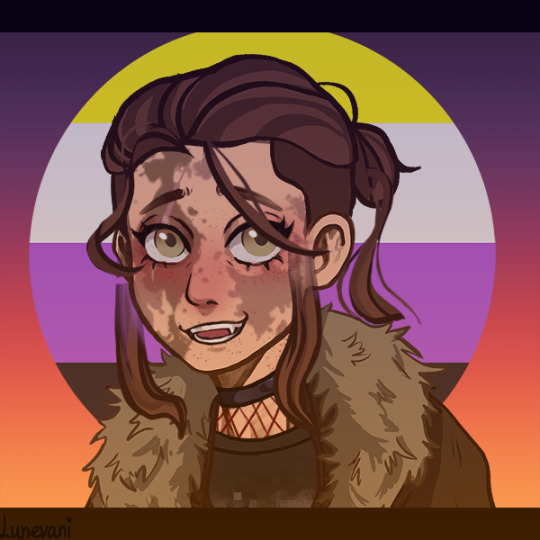
Name: Ayanna Ejiofor
Nickname: Aya (mostly goes by the name), Ana, Cutie (friends), Cub (by Taka), Scar
Age: 18
Birthday: June 15th
Height: 5'4
Gender: Nonbinary (she/they)
Appearance: Ayanna has neck long curly brown hair done up in a hair bun revealing the shaved under sides, light brown eyes and light brown skin with vitiligo, semi long sharp nails either a natural color or painted black
Clothes: She's usually dressed in baggy cargo pants and cropped tee-shirts/cropped tank tops and a large baggy brown fur leather jacket, fishnet shirts and leggings underneath and black combat boots or green sneakers, a black dog collar or a necklace of a claw, mostly clothes that help her move around when working out or running but are still cute.
Personality: Ayanna is very cheerful and what some say "adorkable" but overall sunny and cheery. She's a "too good for the sinful world" kind of person, loyal as Hell, emotional, but mess with her friends or family and you'll get her crazy mean side from verbal combats and physical fights
Schooling: First Year of Collage, studying dance and art
Likes: Jogging, working out, pop and alternative music, dancing, clay art, spending time with friends, Rom-Coms, nyoma choma, yoga, smoothies, romantic charms, fairy tales, happily ever afters, Country music, bike rides, Bob Marley
Dislikes: Assholes, being called annoying or childish, going hungry/being left out from eating or have nothing to eat, someone making fun of her skin, sexism, phobes, racist remarks, ablest, the smell of beer, when she starts crying and can't stop when someone's being mean/arguing to her or her friends
Abilities: Good runner, great cook, great with children, dance, gymnastics, fighting, boxing
Story: Abandoned by her parents when she was very small and was saved by police raiding the "home" she was left at after a long while of emotional and physical abuse that led her being nonverbal for years and suffering with eating issues. She was shipped to an American hospital from Africa at age 9 to get better treatment which seemed to have failed until she met Taka Ejiofor who was the children hospital's strongest supporter for years due to his youth spending there as well, and with his generous charity and seemingly understanding Ayanna began to slowly recover and accept treatment with her finally speaking when seeing him leave one day and running over calling out "Taka!" and then hugging his leg. She later on gets taken in by Taka who treated her with much patients and respect as he helps her study and go through schooling and introducing her to his family with his parents (whom she didn't like), his brother and sister-in-law, and later on his nephew Leon.
With Taka's help and support she was able to be the person she is today though she still had a long journey of recovering, still does
Name Meanings:
Ayanna - Swahili for "beautiful flower"
Ejiofor - Nigerian for "I am bestowed with righteousness and virtue"
I decided to take a chance and make my own magicless/modern AU Disney Villain Recruiters based on many RPs with my friends, mainly inspired by @crazyyanderefangirlfan's Kemonohito siblings and their three friends Jane Vera and Dante
13 notes
·
View notes
Note
Have you read much African literature (apart from Coetzee?)
I confess (if this is a topic requiring confessions) that it hasn't been an area of focus for me. I've one read novel each by Achebe (Things Fall Apart), Salih (Season of Migration to the North), and Gordimer (The Pickup). I've read Soyinka's most famous play, Death and the King's Horseman, his state-of-the-world Reith Lectures (Climate of Fear), and a handful of his other essays on art, culture, and politics. I read Okey Ndibe's Foreign Gods, Inc., and then went to hear the author speak down the street at the Soap Factory, when it still existed; he and his book are very funny. I've read (I even taught) Phaswane Mpe's Welcome to Our Hillbrow; my friend from South Africa, Maurits, now a professor at the University of the Western Cape, pressed it upon me in graduate school after I conceded I'd only read Gordimer and Coetzee. And Alan Paton. We read Cry, the Beloved Country in high school; I think it counted as the non-European selection in 12th-grade world literature. If the colonial diaspora in Africa counts, I've read Olive Schreiner (Woman and Labour) and Doris Lessing (The Golden Notebook); if the postcolonial diaspora in America and Europe counts, I've read Chris Abani (The Virgin of Flames), Teju Cole (Open City), and Marguerite Abouet (Aya de Yopougon). To what continent of the mind does Cavafy's Alexandria belong? Perhaps neither to Africa nor to Europe, to no land at all, but to the Mediterranean Sea. Nevertheless, I have read Cavafy's Collected Poems. Some of Senghor's poetry, too, and his "Negritude: A Humanism of the Twentieth Century." Some of Ngũgĩ's polemics also, e.g., Decolonising the Mind, but not yet one of his novels: illustrating the geographic inequality still obtaining in what our Marxist friends call the "system" of world literature, I keep waiting for the call from Stockholm to impel me, though I do suspect the Swedes gave his prize away to his lesser-known exegete, Abdulrazak Gurnah. I want to read Gurnah's Paradise along with Ngũgĩ's Devil on the Cross. If only for a final reckoning with Marxism, I want to read Burger's Daughter by Gordimer. I know I have to read Bessie Head someday. Soyinka's seems a sensibility as bottomless as that of Joyce or Borges, so I know I have to go back to him, to all the plays and to The Interpreters and Aké and Art, Dialogue, and Outrage. I must return to Egypt—not to Cavafy's Alexandria next time, but to Mahfouz's Cairo, where I fear I've never been. Nuruddin Farah and I used to shop at the same grocery store, but I still need to read him. The to-read list goes on: Mia Couto, Christopher Okigbo, and especially Dambudzo Marechera, whose experimental and anarchic works I've only browsed, but whose cosmopolitan motto I admire: "If you are a writer for a specific nation or a specific race, then fuck you." And a book I should have read 20 years ago, 25 years ago—they should have just made us read it in Catholic school—which I still keep meaning to get to: the Confessions of St. Augustine.
5 notes
·
View notes
Note
Hi! If you're still doing your OC asks, how about 2, 6, and 23? 🙂
2. Does your OC collect anything? What do they collect?
Aya has always been curious about the Old World, and so, while living outside the Encanto, she collected a lot of medicinal herbs and roots and seeds from Europe, Africa, and Asia. She also liked collecting perfumes.
6. What’s your OC’s favorite animal? Least favorite?
Her favorite animal is the long-tailed sylph or cometa verdiazul, a species of hummingbird native to South America.
youtube
Her least favorite animal is the Amazon River dolphin or boto because, while they are fascinating, stories about el hombre bufeo has creeped her out about pink river dolphins forever. 🫣
youtube
23. What is a random fact about your OC?
She is at least a few months older than the Madrigal triplets, likely a Virgo, but I haven't made up my mind about when her birthday is.
Thank you for the ask, @16magnolias !
3 notes
·
View notes
Text
Nigeria's Elizabeth Anyanacho Beats Egyptian Counterpart To Clinch Gold Medal In Women's Under 67Kg
By; JOSEPH ODOEKWU, Accra
Ngeria’s Elizabeth Anyanacho today, beat Egypt’s Aya Mohammed Mahmoud Mohamed Shehata by 2-1 in the final of the Women’s Under 67kg taekwondo to win the gold medal in the taekwondo event in the ongoing 13 African Games.The Egyptian who lost to Anyanacho is Africa’s number one ranked. The 24-year-old started her journey earlier today when she beat Chawquia Zabsore of…
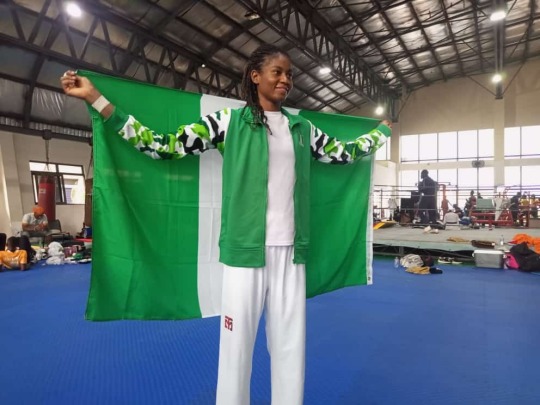
View On WordPress
0 notes
Text
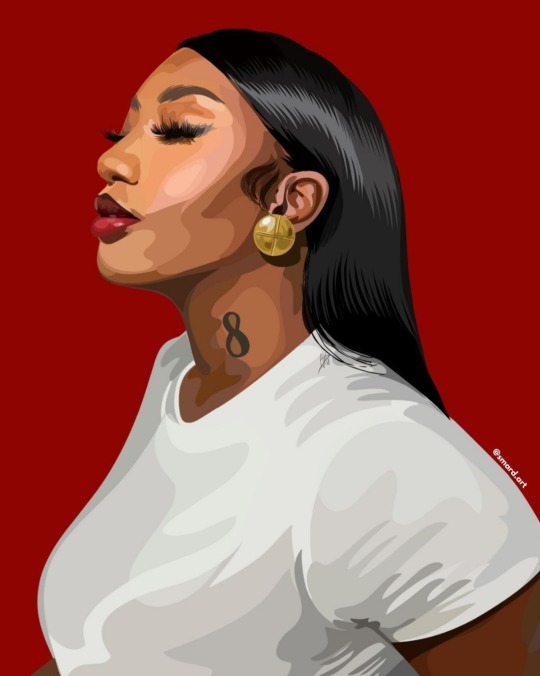
@ smard.art on IG. Aya Nakamura #ayanakamura #femmenoire #africa #feminine #blackqueen 💗 Spread Love
1 note
·
View note
Text
3/13/24 O&A NYC GOING BACK TO AFRICA WITH WALESTYLEZ: Aya Nakamura - Hypé feat. Ayra Starr
Aya Danioko known by her stage name Aya Nakamura, is a French pop artist. Nakamura published her music online, gaining a following with Karma and J’ai mal. Dembo Camara, a long-time friend, became her producer and manager.
Continue reading 3/13/24 O&A NYC GOING BACK TO AFRICA WITH WALESTYLEZ: Aya Nakamura – Hypé feat. Ayra Starr
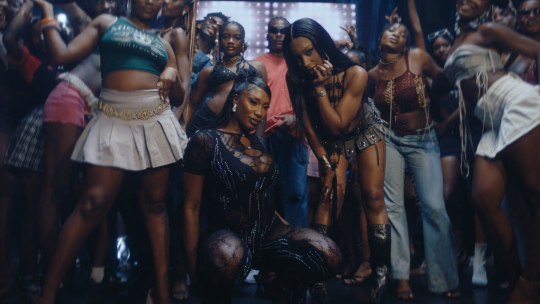
View On WordPress
1 note
·
View note
Text
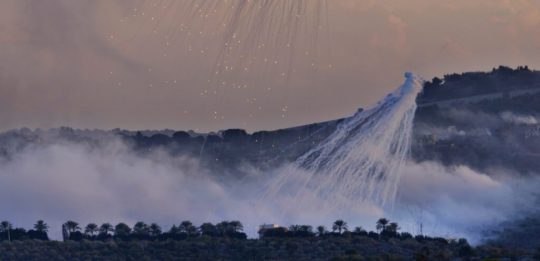
The Israeli army fired artillery shells containing white phosphorus, an incendiary weapon, in military operations along Lebanon’s southern border between 10 and 16 October 2023, Amnesty International said today. One attack on the town of Dhayra on 16 October must be investigated as a war crime because it was an indiscriminate attack that injured at least nine civilians and damaged civilian objects, and was therefore unlawful, said the organization.
Cross-border hostilities in southern Lebanon have escalated significantly since 7 October. Israeli shelling in Lebanon has killedopens in a new tab at least fouropens in a new tab civilians and 48 Hezbollah members so far. Hezbollah and other armed groups have also fired rockets at northern Israel, killing six Israeli soldiers and one Israeli civilianopens in a new tab, according to the Israeli army. Amnesty International is investigating attacks by Hezbollah and other armed groups on northern Israel to determine whether they violated international humanitarian law.
“It is beyond horrific that the Israeli army has indiscriminately used white phosphorous in violation of international humanitarian law. The unlawful use of white phosphorus in Lebanon in the town of Dhayra on 16 October has seriously endangered the lives of civilians, many of whom were hospitalized and displaced, and whose homes and cars caught fire,” said Aya Majzoub, Deputy Regional Director for the Middle East and North Africa at Amnesty International.
“With concern growing about an intensification of the hostilities in southern Lebanon, the Israeli army must immediately halt the use of white phosphorus, especially in populated areas, in line with its forgotten 2013 pledge to stop using these weapons. It must abide by its commitment and stop further endangering the lives of civilians in Lebanon.” (Amnesty International)
8 notes
·
View notes